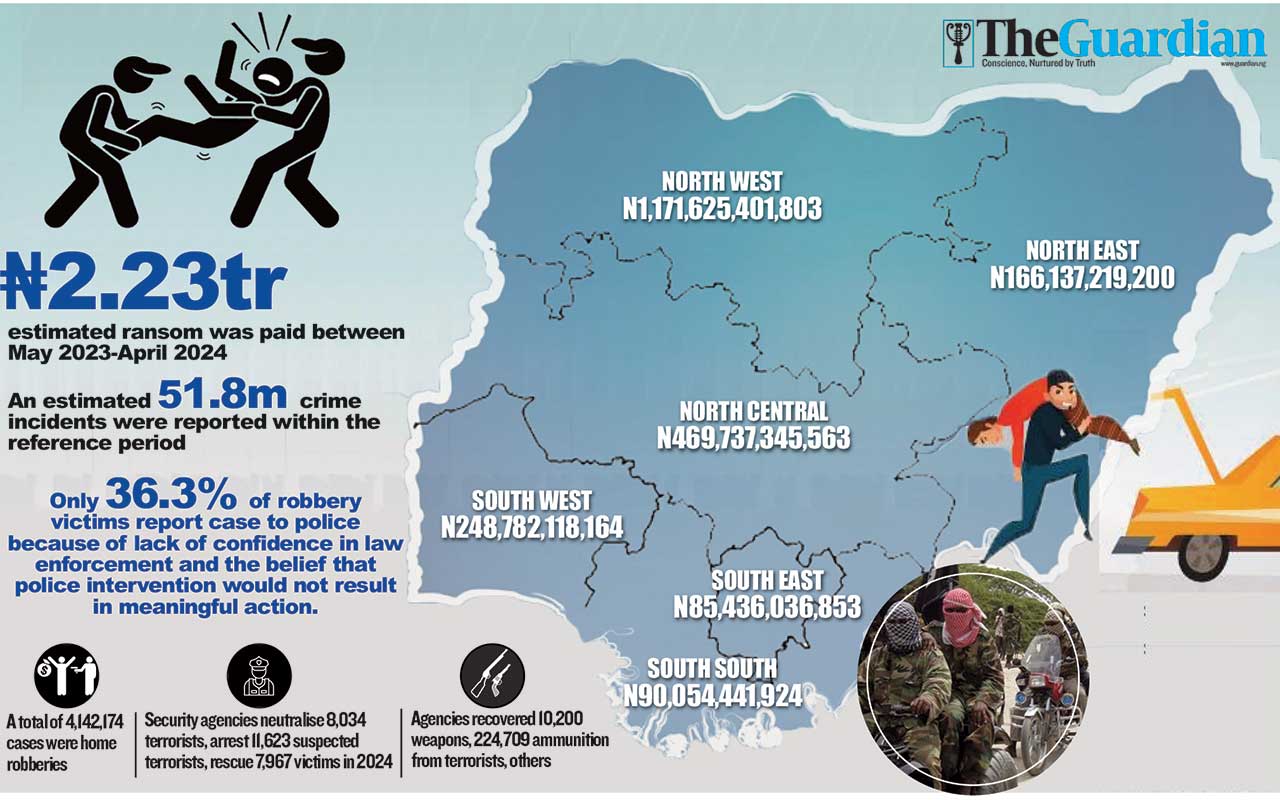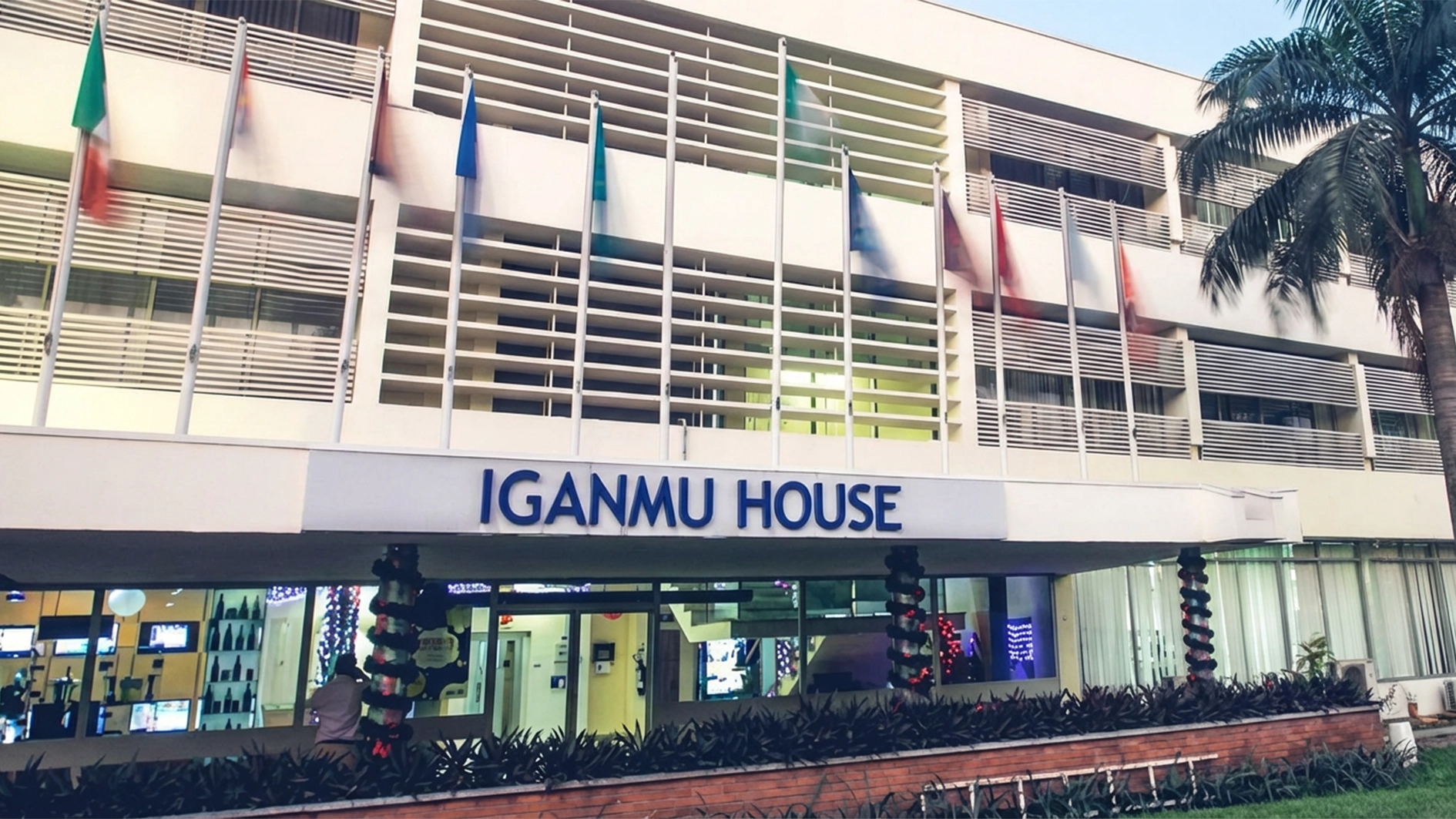 • Households experienced a total of 51.9m crime incidents in 12 months
• Households experienced a total of 51.9m crime incidents in 12 months
• North-West reported highest household crimes at 14.40 million cases
• A total of 4,142,174 cases were home robberies
• Amid trust deficit, only 36.3% of victims of home robbery reported to police
• 65% of kidnapped victims paid a ransom, at average of N2.67 million
• Security agencies neutralise 8,034 terrorists, arrest 11,623 suspects, rescue 7,967 victims
• Recovered 10,200 weapons, 224,709 ammunition from terrorists, others
Amid the growing trust deficit and the overwhelmed security operations nationwide, Nigerians are settling for self-help, with more kidnapped victims paying ransom to gain freedom.
Yesterday, a new report by the National Bureau of Statistics (NBS), the Crime Experience and Security Perception Survey 2024, revealed that Nigerians paid N2.23 trillion as ransom to kidnappers between May 2023 and April 2024.
The Crime Experience and Security Perception Survey (CESPS), which provided in-depth information on the high level of crimes in Nigeria, also stated that Nigerian households experienced a total of 51,887,032 crime incidents within the period.
The report was released a day after the Nigeria 2024 yearly Human Rights Report revealed that at least 526 persons were killed in violent attacks and 949 others kidnapped by criminal elements in parts of the country.
The Human Rights Report also captured attacks by criminal elements on security agents at checkpoints and other security formations, adding that the incidence of insecurity across the country remains on the rise, evidenced by kidnapping, banditry, and communal clashes.
The security agencies, apparently in a subtle reply, reported that the joint efforts by the military, police and other security forces led to the killing of 8,034 terrorists, the arrest of 11,623 suspected terrorists and the rescue of 7,967 kidnap victims in 2024.
According to the CESPS report, about 65 per cent of households that experienced kidnapping incidents paid an average ransom of N2.67 million, totalling N2.23 trillion.
The report disclosed that 4,142,174 households experienced home robbery. Yet, only about 36.3 per cent, which was less than half of the number of the victims, reported their experience to the police.
“The most common reasons for not reporting crimes include lack of confidence in law enforcement and the belief that police intervention would not result in meaningful action,” the report stated.
The report equally indicated that the North-West Geo-political zone of the country reported the highest number of incidents of 14,402,254 cases, followed by the North-Central with 8,771,400, North-East with 7.9 million cases, South-South with 7.7 million and South-West with 6.9 million. Meanwhile, the South-East region reported the least cases, 6.2 million.
Nigeria has been under heavy security threat for over 12 years following the activities of insurgents in the North-West region, which later spread to other parts of the North with hundreds of school children kidnapped and communities sacked completely, a development that culminated in the rise of Internally Displaced Persons (IDP) camped in different parts of the north.
The 2023 Global Peace Index reported that Nigeria ranked 144 out of 163 countries regarding insecurity. Nigeria was also ranked second after South Africa on the list of countries with the highest crime rate in Africa earlier this year.
The high crime rate in the country has been partly blamed for the rising cost of living, especially concerning food prices, as farmers have been unable to access their farms due to fear of being kidnapped or killed by bandits.
Many firms have also shut down their businesses. At the same time, prospective investors have declined invitations to invest in the country due to the worsening security situation, thereby swelling the already teeming unemployment market and denying the country the much-needed foreign direct investment (FDI).
CESPS added that at the individual level, 21.4 per cent of Nigerians reported being victims of crime, and the most common crime was phone theft (13.8 per cent). About 90 per cent of the victims of phone thefts reported to the police, and only 50 per cent of the victims expressed satisfaction with police responses.
Nationwide, an estimated 1.4 million experienced sexual offences, which mainly occurred in someone else’s home (27.7 per cent), followed by the victim’s home (22.2 per cent). Sexual offences are less likely to occur at a public transport station (0.9 per cent), and only 22.7 per cent of victims reported to the police.
Public perception of safety shows that 9.6 per cent of Nigerians believed they might be a victim of crime in the next 12 months. In rural areas, 13.0 per cent of the population thought they could be victims of crime and 7.0 per cent in urban areas.
The Director, Legal Service and Coordinator, Strategic Communications Interagency Policy Committee (SCIPC), Office of the National Security Adviser (ONSA), Zakari Mijinyawa, had stated that the security forces were as well busy during the year, which led to the recovery of 10,200 weapons and 224,709 ammunition from terrorists and other non-state actors.
He added that 30,313 suspected criminals were apprehended, while 1,438 stolen vehicles were recovered from criminals.
Mijinyawa said efforts by security forces in 2024 prevented oil theft valued at N57 billion and raised crude oil production to 1.8 million barrels daily.
According to him, this aligns with the presidential mandate of eradicating crude oil theft in the Niger Delta region.
He said the feat was made possible through the deployment of advanced naval assets, including personnel, helicopters and UAVs, conducting surveillance and interdiction across the Niger Delta region.
“Key successes from January to date include the seizure of illegal refinery sites, the recovery of stolen crude oil, and the disruption of oil bunkering activities.
“In August, the Nigerian Navy seized nine illegal refineries and recovered large quantities of stolen oil.
“September saw the arrest of eight suspects and the seizure of 19 illegal refineries, while October saw 23 illegal refinery sites dismantled,” he said.
Mijinyawa said the Nigerian Correctional Service (NCoS) had effectively ensured the safe and humane custody of over 80,000 inmates and supervised 50,000 offenders on non-custodial measures like community service and probation.
He added that the service provided rehabilitation through vocational training for over 30,000 inmates and education for 2,000 WASSCE candidates, and he facilitated the graduation of 1,000 inmates with diploma and degree programmes from the National Open University of Nigeria (NOUN).
He added that 2,000 juvenile delinquents were rehabilitated and reintegrated into society and ensured timely court appearances for awaiting trial persons.
Mijinyawa said the National Drug Law Enforcement Agency (NDLEA) achieved significant progress in the fight against supply and demand of illicit drugs during the review period.
He said the Nigeria Customs Service (NCS) made significant revenue generation, trade facilitation, and enforcement strides. He added that it exceeded its revenue target, collecting N 5.49 trillion, an 8.1 per cent surplus.
In his reaction, former director of the Department of State Security (DSS), Mike Ejiofor, said the figures are disturbing if they emanate from a reliable source with security agencies endorsing them.
“If a government agency has emerged with these figures, it is disturbing. Again, I question their statistics. Did they get it from the police? How did they compare their statistics? If we are to rely on these figures, then it is quite disturbing. It means that robbery and kidnapping are on the rise contrary to the general belief that they are going down.”
According to Ejiofor, it is an urgent call for security agencies to up their game, especially as the festivities approach.
“Crime rates are normally high during the Yuletide, especially as people travel.”
Without an attempt to justify crimes, Ejiofor blamed the situation on the prevailing economic situation “because people are just looking for ways to survive now, although I am not justifying the criminality of kidnapping and robbery.
“The economic situation has pushed some people into this criminality, but government and security agencies must intensify efforts to bring these things down.
“Citizens also have significant roles because they don’t inform the relevant agencies.
“There is a need to mobilise security agencies because the primary purpose of the government is the welfare and security of the people. If people can lose this amount of money in robbery and kidnapping, then the country is at a loss.
Also, a security analyst, Mr Frank Oshanugor, described the figures as horrible. He expressed worries that kidnapping for ransom has become a thriving industry in Nigeria.
Noting that the country has never recorded such a high incident of armed violence in its history, he feared that kidnapping had become a quick means of getting cheap money.
“From a security point of view, kidnap goes with a low risk for high yield, unlike armed robbery that involves higher risk.
“So, that is the reason more people have resorted to it. It is a horrible development that, if not checked, will cause people to be afraid to move from one place to another soon.
Many people have confided that they would not travel for Yuletide for fear of being kidnapped.”
Oshanugor blamed the situation on the ostentatious lifestyle of leaders amidst poverty and unemployment. He admonished them to judiciously utilise the country’s wealth for overall development rather than self-aggrandisement.
“I see no reason why a Senate President, for instance, should be driving in exotic cars costing millions of naira in a country where people cannot feed.
I see no reason political officeholders should use N150 million on an SUV for one National Assembly lawmaker in a country where people cannot feed. I see no reason a governor should retain up to 250,000 assistants.
“Not until the situation is reversed, the kidnap for ransom syndrome is more likely to continue,” Oshanugor said.
A security expert and Chairman of the Ogun State Police Community Relations Committee (PCRC), Dr Samson Kunle Popoola, noted that statistics showed that insecurity is mostly in the country’s North-West and the North-Central regions.
He stressed that the region, in the last 10 or 12 years, has been going through a lot in terms of Boko Haram and the bandits.
Popoola, however, said there was no justification for insecurity anywhere in the country where we have a government because the primary duty and objective of the government is actually to see to the security of lives and property.
According to him, if so much is now being spent on security and we still have these huge statistics churned at us, then we are getting something wrong.
He said: “The government needs to re-strategise and pay more attention to community policing.
“Community policing, not in terms of starting another outfit that you now call community police or an organisation that looks at that, but we are looking at a situation where the citizens will be empowered to partake in the security of their community.”
Popoola stressed that people cannot be policed if they are not ready or if they are not prepared to support.
On his part, another security expert and specialised private investigator, Dr Matthew Ibadin said the only way to spend money on security with results is to spend it at the right time.
According to him, when you spend money on security and refuse to spend money on the fundamentals, you can’t get any results.
The Nigerian government, he said, is spending money on security, but they are not looking at the symptoms.
“The symptom of what is causing insecurity is our problem. For example, lousy leadership causes insecurity.
“Secondly, spending money on police is also a problem because the government’s inability to spend money on police is also causing insecurity. So, what I’m trying to say is that we have a lot of artisans who are into manufacturing, barber salons and the rest of it. Today, they can’t afford to buy food.
“Now, they are into crime, not because they want to, but because the cost of living is enormous.
“Many companies today, before now, are into production because of the high cost of generating their energy. They have folded up. Those people now have become unemployed. Now, they are going into insecurity. These are the symptoms, for example, I’m talking about.”
Also, the certified protection officer lamented the underfunding of the police, who are supposed to help the government to micromanage the situation.
“Since 1999, no government elected has been able to restructure Nigeria’s police or invest in Nigeria’s police. When you commit a crime, the police lack crime documentation. The infrastructure is not there.
“For example, when you collect money from Bank A and B, you can trace the record of how much you collected. But in the police, when you commit a crime, the other person cannot see it.
“Nigerians and non-criminals are taking advantage of the lack of crime documentation. People are going for election. All the crimes they have committed when they were small are not properly documented.”
To solve the problem, Ibadin called for the amendment of the constitution to allow for state and local Council police to allow for proper control and financing
To a retired Assistant Commandant General of Nigeria Security and Civil Defence Corps (NSCDC), Bille David Urbanus, “Nigeria will continue to spend more on insecurity if we fail to do the right thing.”
The former commandant at the NSCDC Staff College, Jos, said economic security is the only security measure to curb the high level of criminality.
He said: “We have a lot of unemployed youth on the streets. Economic indices are on the increase daily.
“People are finding it difficult even to feed. So, the next thing left to them is to indulge in every crime to survive. I want to say that the government needs to look at the economic aspects of security,” he added.






